- Home
- Gregory Maguire
Son of a Witch Page 12
Son of a Witch Read online
Page 12
She caught his blood in the mortar, and when she’d filled it she rushed to the window and dumped it out. There, jackal moon, you want your blood offering, there it is. She collected a second portion, then a third, and she took off her habit to bind Liir’s arm and stop the flow.
In only her broadcloth shift she shivered, and her fingers trembled. Nonetheless she returned to her instrument. Her musical figures went wobbly, but she kept on.
AFTER GLINDA HAD GONE, Commander Cherrystone took no more notice of Liir than he might a napping dog. He disappeared behind his newspapers, humming to himself. Liir sat on a stool, waiting; something had to happen sooner or later. He watched the Commander’s well-trimmed nails hold the page, listened to various admonitory hums and clicks and editorial humphs breathed nasally. The career soldier was a fit man, a calm one, and his lack of attention to Liir seemed suitable. What was hard to fathom was the Commander’s composure. It was under his command that Nor and her family had been abducted, yet he seemed so oblivious to Liir’s contempt that Liir began to doubt himself. Maybe there was more to the ruling family of Kiamo Ko than he had known.
Not until the business day in the Palace came to an end, and the dozens of civil servants left their desks for home, did the Commander sit up. “Your guide will be along presently—ah, there he is.”
A handsome younger man with a keen, guarded expression blustered into the room. “Can’t have kept you waiting more than a tockety-tick, have I? Witches’ britches, the Palace staff gives you the once-over! Thought things would loosen up once the Wizard abdicated.” He shucked a jacket from his shoulders and slung it across the desk. “You notice. Nice, eh? A clothier in Brickle Lane. Yes, it’s black-market Munchkinsheep wool, I’d have nothing else. Feel that weight.”
“You’ve a prettier penny to spend than a military man does,” observed the Commander dryly.
“She is not that young and I am not that choosy: conditions for a bargain. Bartered it mostly. Fuck, I’m hungry. This is the boy, then. Got a crumpet or a butter roll anywhere, Cherryvery?”
“This is Liir. You’re to take him below and help him as best you can. I know you’ve your mind on other matters, so I don’t pretend to expect you will be thorough in your assistance. But do try. He seems a good sort.”
The young man shot Liir a glance. “He looks too wet to be after what I’m after down there.”
“I suspect he is,” said Commander Cherrystone, “but all good things come to those who wait, and he may grow into a sexual nature before he emerges, if he ever does. Liir, this is Shell.”
“The Witch’s brother?” Liir felt he had to check.
“The same,” said Shell, flexing his fingers. Liir wasn’t sure that he could see a resemblance, but Shell looked capable and cunning both. “Are you ready?”
Does he know who I am, wondered Liir. Has Shell ever heard of a Liir? A boy who might be his nephew?
“I’m ready.”
Commander Cherrystone flicked a speck of dust off his dress weskit. “The usual arrangements about your return, Shell. Liir—I wish you luck.”
He left, locking them into the office. Shell looked at Liir more closely, and his nose twitched as if on the scent of something. Then he shrugged and said, “I’m ready for an ale. You ready for Southstairs?” Liir nodded.
Shell went to an installation of cubbies for the sorting of interoffice mail. Liir couldn’t see how his fingers fussed, nor at what, but in a moment the whole wooden unit slid aside on a secret track. Behind, a plain door, and Shell had the key for it.
“Is this where Southstairs got its name?” asked Liir, pointing to the flight of timber steps that descended treacherously, without benefit of railings, into the gloom.
“Dunno. Never thought about it. Let’s go. I hope your thighs are good. Watch your step.”
“Was your sister a martyr?” asked Liir, innocently as he could.
“Which sister?” he answered, but before Liir could reply, he continued. “Martyrdom implies a religious faith, and Nessarose had so much faith that no one else in the family could breathe. Elphaba affected a salty agnosticism; I never knew whether it was genuine or not. For me to consider them martyrs, I’d have to have faith, and I don’t—not in unionism, the faith of my father; nor in the other varieties that clot the calendar with their hobbledehoy feast days. It took all the fancy dancing I could do not to be tarred as a traitor-by-family-association. Luckily, I have little interest in government, and I’m rather good at dancing, as it happens. Look…Liir, is it…I prefer to save my breath. Shall we not chatter like choirgirls on an outing? That okay with you?”
Liir didn’t answer. The wind siphoning through the slitted windows above made a sound almost like a spiral of music. He wanted to ask Shell if he could hear the strange effect, but he kept his own counsel.
They grew colder and colder as they descended. Soon Liir had to put out a hand, not just to feel his way in the gloom, but also because his legs threatened to buckle beneath him. The wall was damp, here and there soft with wet clinging growth.
Eventually the sound of their steps began to echo, and then it was clear a light was burning below. At last they reached a stone floor from which several dark corridors led.
“Here I usually stretch,” said Shell, and showed Liir how. Liir rubbed his muscles as directed. When they were ready, Shell took a club from a pile on the floor and lit it from the torch affixed to the wall. “Do the same; we won’t spend the rest of eternity together, you know,” he said. “Light is helpful. These are limbs of irongrowth stock, so they burn a good long time.”
“If we’re not going to stick together, how will I find my way out?”
“I don’t know. I assume you’re clever, though.” Shell’s nonchalance was cruel. “Very few emerge from here. Only the guards.”
Liir tried to memorize all of everything, just in case—but he intended to stick with his guide no matter what Shell might think about it.
The way was dank and sour, sometimes cut with a sulfurous gust. The torchlight made a tidal rush against flattened arches of milk grey stone. Parts of the walls were bricked, though the work was ancient and the brick face crumbling.
As they walked along the crushed cement and scattered rubble, and Liir got his breath back, he tried to think of how to speak to Shell. The man was in his late twenties, maybe early thirties, and a certain class of fop; even Liir, knowing himself a rube and a naïf, could see that. But Shell’s eye was keen and his manner, variously courtly or casual, always suave. He was taller than Elphaba had been, sleek where she had been spiky.
As it happened, Liir had no time to ask questions. The path ended in a flight of shallow steps leading farther down. They were reaching the outskirts of Southstairs—not so much a prison as an underground city. The sounds of carts, and a murmur of voices. Somewhere, someone was playing a stringed instrument, far away; somewhere, someone must be cooking, for there was a grievous smell of rendered bacon fat on a hot griddle.
“The cowhand of mercy prepares his rounds.” Shell swept off his hat and left it on a ledge; a curl of yellow plume bobbed in the gloom.
“Will you lead me to Nor?”
“I’ve promised to take you to the central registrar, but I’ve a few stops to make first.” Shell patted the satchel on his shoulder. “Some folks need my attention, and it would be unthinkable to postpone their medications to rush you by first. You don’t mind?”
Liir did. “No, of course not.”
Around another corner, down a few more steps, and they came to a greasy waterway, not unlike the canals above in the Emerald City. “Come on then, if you’re coming,” said Shell, leaping aboard an abandoned canal dory. He seemed to be growing cheerier by the moment.
At length, the narrow waterway ran into a wider channel that curved beneath a high ceiling of rock face supported here and there with beams and buttresses. On either side of the channel, padlocked doors were set flush into the stone walls. Sometimes the doors gave out onto ledges
or a path between cells; more often, just onto the water.
The stench and the noise grew. Before long Liir and Shell passed grey-clothed laborers hauling buckets of supper one way, buckets of feces back.
“Didn’t think a country kid would wrinkle his nose at a rural perfume,” observed Shell, berthing the canal dory. “You’ll stay and guard this; more than once I’ve had my vessel nabbed while I was at my errand of mercy.” He opened the flap of his satchel and removed a small glass syringe filled with a urine-colored solution. He wiped the needle with a clean cloth and then tapped the plunger once to make sure it worked. “Ripe and ready, she is,” he murmured. He looked sideways at Liir. “It’s humbling to be able to help those who suffer.”
With a practiced hand, he quickly undid the lock on a door and slid through, closing it behind him.
Despite his intentions to cling to Shell like a burr, Liir didn’t have the nerve to follow, nor was he tall enough to peer through the small window high in the door. But there was a gap at the bottom between the door and its sill. By sinking to the floor of the dory, Liir could make out the movement of figures inside. Apparently Shell had set his torch in a wall stanchion. His voice sounded soothing, even hypnotic, but the prisoner crouching against a back wall scooched her bare feet underneath her skirts. Shell’s boots drew near until he was standing flush against her. She moaned or whimpered, and her feet curled the farther under her skirts. Mercy was hard to accept, Liir guessed. Shell’s feet rocked from toe to heel, with a comforting rhythm, and his heels began to lift from the floor.
At the sound of someone approaching, Liir turned.
“You, what’re you lying there for?” A portly Ape with a ring of keys, dragging his knuckles on the ground. He was wreathed in his own weather of cheap cologne, protection against the smells, and he wore a collar made of mangy ocelot fur.
“I’m visiting,” said Liir. “With permission of Lady Glinda. I’m accompanying a man named Shell, who is inside tending to the needs of the sick.”
“I’ll say he is, and he’s sicker than most,” said the Ape. “But what Lady Glinda dictates means nothing down here; we’re our own society. Have you a writ of passage from the Under-mayor?”
“We’re on our way to get one. But Shell needed to stop first.”
“He sees to his needs. I’ll see to yours. Come with me.”
“I don’t think I’d better.”
The Ape insisted, and Liir called out repeatedly for Shell, who emerged, cross and agitated. “What’re you bothering my boy for?”
“Oh, he’s your boy?” asked the Ape. “Ever the surprise, Shell.”
“He’s under my care for the moment. Leave him be, Tunkle.”
“You give our Miss Serenity her weekly jab?” asked Tunkle, jingling the keys.
Shell replaced the syringe. “You interrupted me. I’ll go on to the next.”
“He’s a one-man festival of fun,” said Tunkle. “I wouldn’t get too close if I were you. He gets fairly hot and bothered over all these errands of mercy.”
Shell showed no sign of taking offense. “Clear off, Tunkle. We know the ropes. We’re on our way to the Under-mayor. We’ll just take our time, that’s all. You want a lift?”
“Not on your life. I go upside once a month and I can find my own fun, Master Shell; I don’t need your fancy imported sort.” The Ape spit in the waterway and let them go by. “Watch your back, lad.”
Making no effort to lower his tone, Shell remarked to Liir, “Tunkle. A collaborationist. Saved his own hide, during the Wizard’s campaigns, by signing on to bully his own.” Still, his tone was neutral, as if this seemed a reasonable enough strategy.
Liir asked softly, “How far are we from the Under-mayor’s office?”
“A stop or two, or three,” said Shell. “There’s more than one would like my attentions, but I pick and choose, trying to be fair. I can’t be all things to all people, now, can I?” He brushed his lapel and made ready to continue his missionary work.
LIIR DIDN’T KNOW how much time had passed before they finally reached the Under-mayor’s quarters, but Southstairs grew progressively warmer, stinkier, noisier, brighter the farther in they floated. Shell made two or three more stops, always, it seemed, to tend to young women—Liir could hear their voices, supplicating, sometimes weeping, once cursing Shell. But Liir couldn’t see them, nor did he want to.
Shell became more distracted as the hour passed, his bespoke clothes more disheveled. At length, however, they reached their destination. A foreman’s cabin stood freely beneath the lofty ceiling from which, in the stronger light, Liir could make out rock structures, strange candelabras of dripped stone frozen in place.
The prison Under-mayor was a sallow man, skin soft and pale as bleached linen. He looked as if he hadn’t seen the sun in many years. Multiple rings on every finger, even his thumbs: like a fence for stolen jewels. His name was Chyde. “You’re raising someone up in the paths of righteousness, I see,” he said, cheerily enough, to Shell. “I’m not used to thinking of you as concerned about the morals of the young.”
“One does what one can,” said Shell.
“I thought your motto was one does whom one can. But never mind that. You bring news of the starlight goddess?”
“Glinda’s all right. She’s coping. The City’s a mess up there, but you’ll have heard all about it.”
“You always have a special slant, though.” Chyde located some beer and a few stale rings of fried castipod. Liir declined, but Shell tucked in.
“Well, after all these years, it’s a right rich stew up there, that’s for sure,” Shell conceded through a mouthful of flaky breading. “The Wizard’s departure was weirdly unexpected, given he’s been in power for so long. Still, with so many having schemed behind the scenes to oust him, you’d think they’d have gotten their signals straight about what ought to happen next. Lady Glinda is looking in, a glamorous figurehead, and no one knows if she’s got a scrap of brain in her noggin. The trade unions should be rising any day, but the municipal militia wasn’t quite prepared to recognize a socialite for a queen. Hence, in loyal support of course, the guard has been on the offensive, clearing out the neighborhoods where the rabble is more likely to rouse. Glinda thinks it’s urban revitalization. So it’s an interesting time, a sweep of forces with everyone assessing the power of the other. Heads will roll, of course. It’s merely a question of in what sequence: who gets to laugh first, and who next, and whose laugh is cut off by the guillotine blade.”
“And you’ll be stealing in and out of the bedchambers of the wenches and the wives and the widows…”
“The wives laugh neither first nor last, but they do laugh best!”
“I live a quiet life down here,” said Under-mayor Chyde to Liir. “It’s part of your dad’s program of good works to fill me in on the local gossip. I could go northstairs if I could trust a soul, but I don’t trust a soul. And the minute the selfish bastards up there remember their relatives down here, if they ever do, I’ll be hamstrung before morning and bled by noontime. I’ve never felt I could leave my post, but especially not now. Not if I want to survive through these interesting times.”
“He’s not my father,” said Liir coldly.
“Oh? I thought I caught a resemblance,” said Under-mayor Chyde. “Well, more’s the pity. You’re training an apprentice, are you, Shell?”
Shell yawned and drained his beer. “No. I promised Lady Glinda I’d deliver this spawnling to you. He’s searching for a prisoner.”
“We’re all searching for someone,” said Under-mayor Chyde in a drawl. “People pay me well to begin searches I can’t somehow ever manage to complete.” He flashed his jeweled hands. “Care to make a contribution to the exhibit, lad?”
“He’s not buying your silence or your service,” snapped Shell. “Get on with it, Chyde-ey, or I’ll report your side business to the authorities. Lady Glinda has an interest in jewels herself, as it happens. A more seemly interest. She might not li
ke to hear—”
“Name?” interrupted Chyde.
“Her name was Nor,” said Liir. “Is Nor. About, oh, sixteen? She was abducted by the Gale Forcers at the castle of Kiamo Ko, out west. In the Vinkus.”
“I can’t say the name sounds familiar, but we house an exclusive clientele, some of whom like to keep a low profile. We respect their wishes, of course.”
“Her father was the prince of the Arjikis.”
“A crowned head? Well, if she’s here, she must have one of the private suites. You haven’t been to offer her your particular brand of solace, Shell?” Under-mayor Chyde snapped his fingers with a clink and said, “Jibbidee, bring me the two green ledgers. No, sorry, the ocher ones, if she’s a Winkie.”
“She’d be young still,” said Shell. “Or young-ish. I do have some standards, Chyde.”
An elf with ears in an advanced state of decomposition appeared from a cupboard and scrambled about a rickety bookshelf. “Thank you, Jibbidee,” said Chyde, without inflection, and the elf returned to his cupboard and shut the door behind him when his job was done.
“You might remember the circumstances of her registering,” said Shell. “It was the same castle where my sister lived until recently.”
“Oh, that Kiamo Ko. How could I be so slow?” Chyde slid a pair of spectacles off his pate and down to his nose, and squinted. “My former wife, save her blessed hide, always said that I’m such a big-hearted guy, you know, everyone’s story gets to me, and so I can’t keep them straight. My heart bleeds for all. One and all.” Harumph. “Part of our marital problems, but so be it.”

 Missing Sisters
Missing Sisters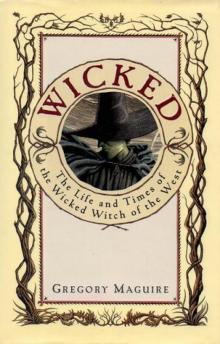 Wicked: The Life and Times of the Wicked Witch of the West
Wicked: The Life and Times of the Wicked Witch of the West After Alice
After Alice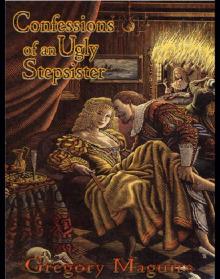 Confessions of an Ugly Stepsister
Confessions of an Ugly Stepsister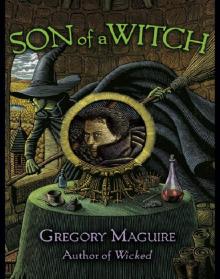 Son of a Witch
Son of a Witch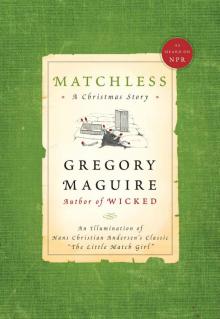 Matchless
Matchless The Next Queen of Heaven
The Next Queen of Heaven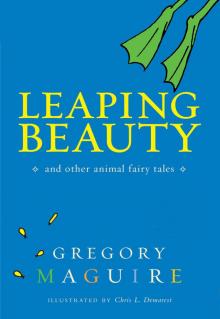 Leaping Beauty: And Other Animal Fairy Tales
Leaping Beauty: And Other Animal Fairy Tales Hiddensee: A Tale of the Once and Future Nutcracker
Hiddensee: A Tale of the Once and Future Nutcracker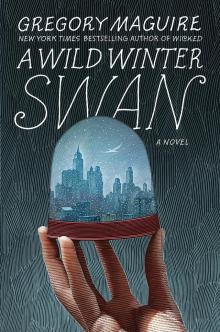 A Wild Winter Swan
A Wild Winter Swan Egg & Spoon
Egg & Spoon Out of Oz
Out of Oz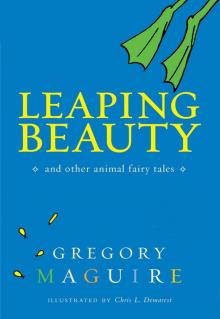 Leaping Beauty
Leaping Beauty Hiddensee
Hiddensee The Wicked Years Complete Collection
The Wicked Years Complete Collection The Next Queen of Heaven: A Novel
The Next Queen of Heaven: A Novel